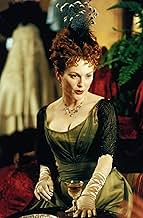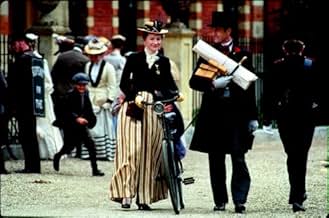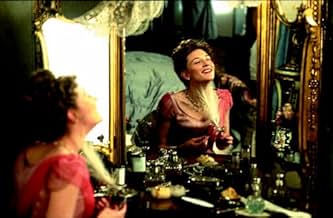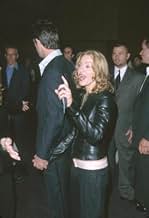London 1895: Cabinet minister, Sir Chiltern, and bachelor, Lord Goring, are victims of scheming women.London 1895: Cabinet minister, Sir Chiltern, and bachelor, Lord Goring, are victims of scheming women.London 1895: Cabinet minister, Sir Chiltern, and bachelor, Lord Goring, are victims of scheming women.
- Nominated for 3 BAFTA Awards
- 4 wins & 17 nominations total
- Director
- Writers
- All cast & crew
- Production, box office & more at IMDbPro
Featured reviews
Gertrude (Cate Blanchett) is an English aristocrat in the Edwardian era. She is very much in love with her husband, Robert (Jeremy Northam), a rising star in the British Parliament. Yet, an old schoolmate of Gertrude's, the conniving Laura (Julianne Moore) arrives back in town with a mission. She knows a secret about Robert that would bring about his ruin and decides to pressure him to support a government bill that would invest heavily in a Argentine adventure, one she has staked her money on as well. What can Robert do? He turns to a close friend, Lord Arthur (Rupert Everett) for help. Arthur, a rich and witty bachelor, offers what support he can. But, with women chasing him around every corner, including Robert's sister, Mabel (Minnie Driver), can Arthur devote the time required to saving his friend? And, will Gertrude have to be told about the blackmailing, causing her to lose some faith in the husband she thinks is "ideal"? This film, based on a play by Oscar Wilde, is a sophisticated and charming movie of the highest order. As such, it is replete with clever and mirthful lines, lovely costumes, beautiful sets, and memorable characters. As the principal actors, Blanchett, Northam, Everett, Driver, and Moore are excellence itself, laying doubt that anyone else could have filled their roles in a better manner. Yes, it is a dialogue-driven film but it is never stuffy or boring. If you have enjoyed such movies as Emma or A Merry War, this one is an ideal choice for your next film engagement. But, even if you are channel surfing and stumble across the flick on some lonely night, you will be drawn to its universal humor and humanity.
As I left this movie, someone said "How nice to see an intelligent movie!"
The risk going in was that it would be ONLY an intelligent - or at least clever - piece, all period manners and costumes. In fact, with all the Oscar Wilde wit which sounds wonderfully fresh here, there are also rich moments of emotional depth throughout this amusing but also quite moving film.
One theme here - touching in hindsight - is how little it can take to destroy a reputation - Wilde was later to have some of the most painful possible firsthand experience of this. But the central question here, which anchors the humor and beauty that decorate it, is the cost of rigorous, even rigid, honesty. And the growth of the central characters on this point shines through, even through the dance of wit and farce.
Underpinning this is a surprising faith in human nobility, quite in contrast to the ironic persona Wilde maintained. It struck me while watching it both that Wilde had very French characteristics - a continental finesse, the love of repartee - and yet was profoundly an English writer by virtue of his faith in fair play and the bonds of (platonic) male friendship.
In fact, Lord Goring, whose world-weary ways make him something of a surrogate for Wilde, is a distant cousin to Sidney Carton in coming to the defense of a 'nobler' friend even at great (possible) sacrifice to himself. His very lack of seriousness is what makes his efforts on behalf of his friends so moving.
With this, the pure visual beauty of actors like Cate Blanchett and Rupert Everett, matched by sumptuous costumes and sets, adds a sensuous element which, in a lesser film, might have dominated the movie. They, with Minnie Driver in cheeky comic form and Julianne Moore sweetly evil and superbly English, make it a delight both to watch and to savor later as tart food for thought.
The risk going in was that it would be ONLY an intelligent - or at least clever - piece, all period manners and costumes. In fact, with all the Oscar Wilde wit which sounds wonderfully fresh here, there are also rich moments of emotional depth throughout this amusing but also quite moving film.
One theme here - touching in hindsight - is how little it can take to destroy a reputation - Wilde was later to have some of the most painful possible firsthand experience of this. But the central question here, which anchors the humor and beauty that decorate it, is the cost of rigorous, even rigid, honesty. And the growth of the central characters on this point shines through, even through the dance of wit and farce.
Underpinning this is a surprising faith in human nobility, quite in contrast to the ironic persona Wilde maintained. It struck me while watching it both that Wilde had very French characteristics - a continental finesse, the love of repartee - and yet was profoundly an English writer by virtue of his faith in fair play and the bonds of (platonic) male friendship.
In fact, Lord Goring, whose world-weary ways make him something of a surrogate for Wilde, is a distant cousin to Sidney Carton in coming to the defense of a 'nobler' friend even at great (possible) sacrifice to himself. His very lack of seriousness is what makes his efforts on behalf of his friends so moving.
With this, the pure visual beauty of actors like Cate Blanchett and Rupert Everett, matched by sumptuous costumes and sets, adds a sensuous element which, in a lesser film, might have dominated the movie. They, with Minnie Driver in cheeky comic form and Julianne Moore sweetly evil and superbly English, make it a delight both to watch and to savor later as tart food for thought.
One of good adaptations. For performances - Rupert Everett as the inspired choice for each "translation" of Oscar Wilde universe - but, in same measure, for a sort of freshness of a case of inspired use of the nuances of Wilde humor. A film about a man and his secrets and the prices of confidence. Seductive. And simple. And, maybe, lovely.
It's quite a long time that i haven't seen such a perfect movie: a highly talented cast, a lavishing setting and a finely chiseled and powerful script.
Here, you got an all-star team: Driver as the eccentric but romantic young woman (unfortunately a falling star that hasn't shine for a long time), Moore as the Machiavellian lonely woman, Everett as the helpful friend, "Sir Robert" as the courageous man and ... Blanchet as the lovely wife whom characterization deeply moved me. In my tumultuous life, i was just wondering what's the special gift a woman can offer (me) to fall in love: beauty, wit, sensuality, wealth, power? Gertrude has nothing of that but her kindness, her attention, her devotion left me under the spell. She could become easily my ideal wife.
Then, the story happens in the Victorian time for which i have also a strong tie. I just really appreciate the British phlegm: you can say the more vile things but always with class. Here, you find cupidity, blackmail, lies, ambition but there's nor a fight nor a shout!
At last, the script is really well written: you don't know if this is a romance, a buddy movie, a thriller or a tragedy. I really like the morals questions the movie asks: can a bad action be redeemed? How can a true friend be helpful? Does love live with lies? The answers are not brought in a dull, academic patronizing way but playfully because all the characters seems to orbit around each other!
In conclusion, it's a sort of lighter and happier "Carlito's way" thus a great movie that is maybe really unknown.
Here, you got an all-star team: Driver as the eccentric but romantic young woman (unfortunately a falling star that hasn't shine for a long time), Moore as the Machiavellian lonely woman, Everett as the helpful friend, "Sir Robert" as the courageous man and ... Blanchet as the lovely wife whom characterization deeply moved me. In my tumultuous life, i was just wondering what's the special gift a woman can offer (me) to fall in love: beauty, wit, sensuality, wealth, power? Gertrude has nothing of that but her kindness, her attention, her devotion left me under the spell. She could become easily my ideal wife.
Then, the story happens in the Victorian time for which i have also a strong tie. I just really appreciate the British phlegm: you can say the more vile things but always with class. Here, you find cupidity, blackmail, lies, ambition but there's nor a fight nor a shout!
At last, the script is really well written: you don't know if this is a romance, a buddy movie, a thriller or a tragedy. I really like the morals questions the movie asks: can a bad action be redeemed? How can a true friend be helpful? Does love live with lies? The answers are not brought in a dull, academic patronizing way but playfully because all the characters seems to orbit around each other!
In conclusion, it's a sort of lighter and happier "Carlito's way" thus a great movie that is maybe really unknown.
An Ideal Husband - ****
In 19th Century London, Sir Robert Chiltern (Jeremy Northam,) is a successful member of parliament married to the virtuous, fabulously popular Lady Gertrud Chiltern (Cate Blanchett.) Sir Robert's sister Mabel (Minnie Driver) is infatuated with Sir Robert's friend, Lord Arthur Goring (Rupert Everett.) The dashing Lord Goring, the wealthy son of the Earl of Caversham, is an inveterate bachelor who lives a life of leisure. Into this already crowded picture drops Mrs. Laura Cheveley (Julianne Moore,) an Austrian socialite with two ex-husbands and a convoluted past. Not only was she briefly engaged to Lord Goring, but it seems that she possesses evidence that the noble Sir Robert once committed a terrible indiscretion. Mrs. Cheveley uses this explosive evidence in her attempt to blackmail Sir Robert into voting against his conscience on the floor of Parliament. What ensues is a fascinating examination of honor and idealism. We learn that the noble Sir Robert is less than perfect, while the rakish bachelor Lord Goring possesses a surprising level of honor and insight.
If Shakespeare in Love deserved an Oscar, this film deserves the Nobel Prize. It is simply outstanding in every respect. The first thing one notices is the dialogue. It is a bit stiff and stilted, as was the custom in London at the time, but it also possesses a razor sharp wit and sly sense of humor. Every last character speaks with intelligence and humor. The verbal fireworks, particularly as provided by Lord Goring, illuminate character and motivation while simultaneously producing guffaws from the audience. The plot structure is a marvel. There are no explosions, fireballs, or car chases, but the picture achieves a certain breathlessness simply through its intricate layering of multiple characters, all with intertwining motivations, interests, and connections with one another. A prime example of this is the scene in which poor Lord Goring receives multiple visitors at his home in a single night. All of the visitors have conflicts with one another, so Lord Goring must segregate them and move from room to room, listening to their problems and providing insights. The costumes and locations are all excellent. I particularly liked the manner in which Sir Robert's bright home is contrasted with Lord Goring's dark and cavernous bachelor pad. The one complaint I have is with the film's music; it seemed too light and frivolous, overplaying the "madcap shenanigans" element of the picture. But this is a minor quibble indeed.
The acting is first rate across the board. Jeremy Northam (yes, he could play James Bond) is well suited to the role of Sir Robert. He exudes intelligence, honor, and duty. Julianne Moore, as Mrs. Cheveley, seems to relish the conniving and scheming of her character. Cate Blanchett and Minnie Driver capably bring depth and intelligence to their limited roles. But the true star of the film is Rupert Everett as Lord Arthur Goring. Mr. Everett has had a promising career to this point, but An Ideal Husband is his breakout role. In this film he is witty, charming, caring, wise, devilish, and childish all at once. Lord Goring is the kind of man that makes women swoon and men flock around to hear funny stories. He reminded me of Cary Grant - only better. Someone give that man an Academy Award.
In 19th Century London, Sir Robert Chiltern (Jeremy Northam,) is a successful member of parliament married to the virtuous, fabulously popular Lady Gertrud Chiltern (Cate Blanchett.) Sir Robert's sister Mabel (Minnie Driver) is infatuated with Sir Robert's friend, Lord Arthur Goring (Rupert Everett.) The dashing Lord Goring, the wealthy son of the Earl of Caversham, is an inveterate bachelor who lives a life of leisure. Into this already crowded picture drops Mrs. Laura Cheveley (Julianne Moore,) an Austrian socialite with two ex-husbands and a convoluted past. Not only was she briefly engaged to Lord Goring, but it seems that she possesses evidence that the noble Sir Robert once committed a terrible indiscretion. Mrs. Cheveley uses this explosive evidence in her attempt to blackmail Sir Robert into voting against his conscience on the floor of Parliament. What ensues is a fascinating examination of honor and idealism. We learn that the noble Sir Robert is less than perfect, while the rakish bachelor Lord Goring possesses a surprising level of honor and insight.
If Shakespeare in Love deserved an Oscar, this film deserves the Nobel Prize. It is simply outstanding in every respect. The first thing one notices is the dialogue. It is a bit stiff and stilted, as was the custom in London at the time, but it also possesses a razor sharp wit and sly sense of humor. Every last character speaks with intelligence and humor. The verbal fireworks, particularly as provided by Lord Goring, illuminate character and motivation while simultaneously producing guffaws from the audience. The plot structure is a marvel. There are no explosions, fireballs, or car chases, but the picture achieves a certain breathlessness simply through its intricate layering of multiple characters, all with intertwining motivations, interests, and connections with one another. A prime example of this is the scene in which poor Lord Goring receives multiple visitors at his home in a single night. All of the visitors have conflicts with one another, so Lord Goring must segregate them and move from room to room, listening to their problems and providing insights. The costumes and locations are all excellent. I particularly liked the manner in which Sir Robert's bright home is contrasted with Lord Goring's dark and cavernous bachelor pad. The one complaint I have is with the film's music; it seemed too light and frivolous, overplaying the "madcap shenanigans" element of the picture. But this is a minor quibble indeed.
The acting is first rate across the board. Jeremy Northam (yes, he could play James Bond) is well suited to the role of Sir Robert. He exudes intelligence, honor, and duty. Julianne Moore, as Mrs. Cheveley, seems to relish the conniving and scheming of her character. Cate Blanchett and Minnie Driver capably bring depth and intelligence to their limited roles. But the true star of the film is Rupert Everett as Lord Arthur Goring. Mr. Everett has had a promising career to this point, but An Ideal Husband is his breakout role. In this film he is witty, charming, caring, wise, devilish, and childish all at once. Lord Goring is the kind of man that makes women swoon and men flock around to hear funny stories. He reminded me of Cary Grant - only better. Someone give that man an Academy Award.
Did you know
- TriviaThe green carnation that Arthur selects for his buttonhole is a subtle homage to Oscar Wilde. Wilde and his "inner circle" of gay friends used to wear green carnations as a way of discreetly displaying their sexuality.
- GoofsAt the reception at the Chiltern's home, Sir Robert is requested to meet the Indian Ambassador. In 1895 India was a British possession and there could not be such an Ambassador who represents only independent states.
- Quotes
Lord Caversham: What are you doing here, sir? Wasting your time, as usual?
Lord Arthur Goring: My dear father, when one pays a visit, it is for the purpose of wasting other people's time and not one's own.
- Crazy creditsThe credits list Oliver Parker, the director, as playing "Bunbury", one of the gentlemen that is seen playing cards with Lord Goring in the Men's Club when Lord Chiltern arrives. Bunbury is also a never-seen character in "The Importance of Being Earnest", the play which is performed in the background of several scenes of this film.
- How long is An Ideal Husband?Powered by Alexa
Details
- Release date
- Countries of origin
- Official site
- Language
- Also known as
- Ідеальний чоловік
- Filming locations
- Production companies
- See more company credits at IMDbPro
Box office
- Budget
- $14,000,000 (estimated)
- Gross US & Canada
- $18,542,974
- Opening weekend US & Canada
- $192,802
- Jun 20, 1999
- Gross worldwide
- $18,542,974
- Runtime
- 1h 37m(97 min)
- Sound mix
- Aspect ratio
- 1.85 : 1
Contribute to this page
Suggest an edit or add missing content










































